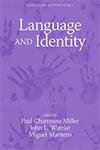
Language and Identity
Edited by:
Paul Chamness Miller
John L Watzke, International Society for Language Studies, Inc.
Miguel Mantero, The University of Alabama
A volume in the series: Readings in Language Studies. Editor(s): John L Watzke, International Society for Language Studies, Inc.. John W. Schwieter, Wilfrid Laurier University.
Published 2022
Language and Identity is the third volume of the Readings in Language Studies series published by the International Society for Language Studies, Inc. Edited by Paul Chamness Miller, John L. Watzke, and Miguel Mantero, volume three sustains the society's mission to organize and disseminate the work of its contributing members through peer-reviewed publications. The book presents international perspectives on language and identity in several thematic sections: discourse, culture, identity in the professions, policy, pedagogy, and the learner. A resource for scholars and students, Language and Identity, represents the latest scholarship in new and emergent areas of inquiry.
CONTENTS
Introduction. SECTION I: LANGUAGE, IDENTITY AND DISCOURSE. The Impact of English on the Saudi Woman’s Identity, Reema Alsweel. Irish Diaspora and National Identity: Circulations of Public and Private Discourse in a Discourse-Historical Analysis of The Toronto Globe and Mail, Jennifer Clary-Lemon. Imagined Communities: Identity and English as a Global Language, Erin Mikulec. Language Environment and Identity: The Effects of a Short-Term Return Trip Abroad on a Japanese Adolescent Double, Brian G. Rubrecht and Kayoko Ishikawa. Constructing “Them” from “Their” Perspective: The Discursive Image of Latinos Created by Latino Authors, Megan Strom. Mediated Humor in the Legal Setting: The Construction of New Identities, Marjorie Zambrano-Paff. The Representation of Social Actors and Transitivity Clauses in Three Online English Broadsheets in the Philippines, Clarisse Ann P. Ilustre. Language Brokering in Practice: Linguistic Power, Biliteracy Events, and Family Life, Steven Alvarez. SECTION II: LANGUAGE, IDENTITY AND CULTURE. (Mis)Use of Pronouns as Index of Bicultural Identity, Patricia Gubitosi and Elena García Frazier. Imagined Identities: An Examination of Self-Authorship on Facebook, Luba V. Iskold. From West Indian Black to Afro-Costa Rican: A Socio-Historical Perspective on the Role of Language, Race and Culture in the Transition, Lisbeth A. Philip. The DEAF^WORLD and Competence in ASL: Identity and Language Issues, Timothy Reagan. Papiamento/u: The Language that Identifies the People of Aruba and Curaçao, Keisha Irma Wiel. Reading—From Hating to Loving: High School Students’ Identities, Honored through Culturally Relevant Literature, Mia Angelica Sosa-Provencio. SECTION III: LANGUAGE, IDENTITY AND THE PROFESSIONS. Stayers and the Leavers: The Identity of S/FL Teachers at a Time of Critical Shortage, Peter B. Swanson. English as a Dominant Language: Locating Foreign Language Teaching within Bourdieu’s Framework of Capital, Jihyun Nam. Identity Negotiation in the Workplace: Shifting Between Imposed, Claimed, and Negotiable Identities, Gloria Vélez-Rendón. Confessions of a Cultural Drag Queen, or Reflections on Acting Like the Native Speaker in Foreign Language Education, Jennifer Wooten. SECTION IV: LANGUAGE, IDENTITY AND POLICY. Examining Professional Identity Development through L2 Student Teacher Journals, David R. Byrd. Language Educational Policy and the Children of Economic Migrants: Learning from the Experiences of South American Families in Japan, Cheiron McMahill and Erica Muramoto. Wat is ’n Suid-Afrikaner? Constructions of Identity in the New South Africa, Timothy Reagan. Language Use in the Education of Elementary School Children in Kinshasa Congo, Karen M. Van Wyk. Language Rights in the United States Constitution and the Civil Rights Act of 1964, Eduardo D. Faingold. SECTION V: LANGUAGE, IDENTITY AND PEDAGOGY. Re-Conceptualizing Teacher and Learner Identities for a Paradigm Shift Towards a Cosmopolitan English Education Curriculum, Naghmana Ali. The Crossing Over—When Vernacular Language Speakers Become Teachers of Major Languages, Clover McKenzie, and Judith Orogun. Power Dynamics in a Multilingual Korean Language Classroom and Pedagogical Implications, Jeeweon Shin. Discovering Cultural/Linguistic Identities for Borderland 3 Pre-Service Teachers to Enhance Academic Writing, Nancy Wasser. Should There Be a Sixth “C”? Critical Pedagogy in the Foreign Language Teaching and Learning Context, Timothy Reagan. SECTION VI: LANGUAGE, IDENTITY AND THE LEARNER. Exploring the Value of Heritage Languages and Cultures in Public Schools in a Globalizing World: The Case of Mandarin Classes in a Secondary School, Roumiana Ilieva. Short-Term Study Abroad and Cultural Sessions: Issues of L2 Development, Identity, and Socialization, John Schwieter and Sarah J. Kunert. A Study of Communication Strategies Used by EFL Learners, Huei-Chun Teng. Learning English as a Foreign Language: Act of Identity or Act of Conformity? Gerrard Mugford. Index. About the Contributors.
-
Paperback978-1-64802-759-8
Web price: $62.04 (Reg. 72.99)
-
Hardcover978-1-64802-760-4
Web price: $89.24 (Reg. 104.99)
- eBook978-1-64802-761-1

- EDU018000 - EDUCATION: Language Experience Approach
- EDU029080 - EDUCATION: TEACHING METHODS & MATERIALS: Language Arts
- EDU038000 - EDUCATION: Student Life & Student Affairs








